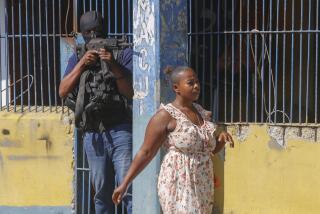Factions of Aristide Party Look to Different Futures
- Share via
PORT-AU-PRINCE, Haiti — As Haiti’s crippled body politic tries to mend itself for fall elections, activists in former President Jean-Bertrand Aristide’s Lavalas Party are risking the pitfall of “divide and conquer.”
Until recently, Lavalas politicians had refused to take part in preparations for the vote, demanding that Aristide first be allowed to return from South African exile and serve out his term.
But as pragmatism sets in and senior Lavalas figures cast an eye to the future, many are giving up on that notion and are cooperating with erstwhile opponents to organize elections and save the movement’s populist ideals, if not its charismatic founder.
“There’s more to Lavalas than Jean-Bertrand Aristide,” said Ivon Feuille, former head of the Senate, which no longer functions. Most members’ mandates expired over the last five years, as Haiti failed to hold elections.
The National Election Council recently set municipal balloting for Oct. 9, a legislative and presidential vote for Nov. 13 and runoffs for the national posts Dec. 18.
Two factions of Lavalas have formed, Feuille said, one accepting that Aristide won’t return from his second exile, as he did on the back of a U.S. invasion in 1994 after being deposed in a coup.
Feuille said he, fellow former Sen. Gerald Gilles and a handful of other prominent Lavalas members wanted to take advantage of the party’s continuing popularity.
“We’ve taken the very difficult position of encouraging people to go to the elections,” Gilles said. “We don’t want to deceive the people. The return of Aristide to Haiti is extremely difficult, maybe impossible. Even when [President] Bill Clinton and the United States were on his side, it took three years for him to come back, and up to now the international community is not at all in favor of his return.”
Most members want to move on, he said, and hope to recapture poor Haitians’ passionate support for Aristide and his promises to lift them from a 200-year legacy of despair.
“I was one of the closest collaborators of President Aristide, and I will not vilify or criticize him,” Gilles said. “Jean-Bertrand Aristide played a historic part in this country, but we have to go ahead and fight for another Haiti.”
Although many Lavalas activists are abroad or in hiding, the moves to revive the party are drawing supporters out of the shadows. In the last few weeks, the party has organized in all nine states, and the wing ready to participate controls 136 electoral regions compared with three under the sway of those still advocating a boycott, Feuille said.
Despite the more cooperative approach espoused by some Lavalas figures, both factions say their members are being hounded.
Feuille and fellow lawmaker Rudy Heriveaux spent nearly three months in jail for allegedly inciting violence during a radio broadcast last fall. They contend that they were appealing to party loyalists to demonstrate peacefully for Aristide’s return.
“The government got scared that Lavalas could win the new elections. That’s why they arrested me,” Feuille said, alleging that police planted a gun in his car to frame him.
Also claiming to represent the majority in Lavalas, former executive committee member Phelito Doran reiterates that until Aristide returns to the National Palace, the party will not take part in elections or an on-again, off-again political round-table intended to foster social reconciliation.
“The mandate of our president is not yet over,” Doran, a former Lavalas legislator from Petionville, said of Aristide’s term, which was supposed to run until February 2006. “Any true, honest election has to take into account this reality.”
The boycotting faction forms its policy through communication with Aristide and Lavalas activists who have taken refuge in Florida and New York, Doran said.
James Derosin, another former lawmaker, says that he cannot safely return to his base in Cap-Haitien because Lavalas members are being persecuted. He says the party will take part in the elections on three conditions: Aristide’s return to Haiti, the liberation of all “political” prisoners and “an end to the arbitrary arrests and summary executions” of Aristide supporters.
“We don’t recognize the coup d’etat and kidnapping,” Derosin said, referring to Aristide’s Feb. 29, 2004, flight into African exile on a U.S.-chartered jet.
Although he recognized the difficulty of reinstating Aristide, he argued that “mobilizing the population” and seeking help from foreign supporters of the exiled president could still make it happen.
In his cell at the penitentiary here, former Prime Minister Yvon Neptune is Exhibit A in Lavalas charges that the interim government represses members of the former ruling party. Even some of Aristide’s harshest critics, such as wealthy businessman and opposition leader Andre Apaid, acknowledge that they feel uneasy with Neptune’s eight-month incarceration without arraignment.
Neptune said he had no plans to return to politics if he was cleared of accusations that he ordered political killings. However, he indicated that he might be willing to be recruited if Aristide asked him to pick up the Lavalas banner.
The split in the party could strengthen it by creating competitive factions, the former prime minister said. “This shouldn’t be looked at in a negative way.”
More to Read
Sign up for Essential California
The most important California stories and recommendations in your inbox every morning.
You may occasionally receive promotional content from the Los Angeles Times.














